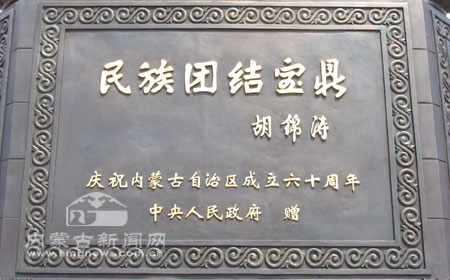China
Lauds Minority Rights on Key Anniversary
|
Ben Blanchard,
Reuters |
|
August 8, 2007 |
 |
|
| With its name
inscribed by the Chinese President Hu Jintao, the
"National Unity Treasury Tripod", was sent to the
Inner Mongolia Autonomous Region to celebrate the 60
years so-called "national unity" of the region
(photo from Inner Mongolia News) |
|
BEIJING
(Reuters) - China on Wednesday lauded the 60th anniversary of
the founding of Inner Mongolia, its first self-proclaimed region
run by ethnic minorities, saying the fate of minorities and the
Han Chinese was inextricably linked.
China's Communists set up Inner
Mongolia in 1947, two years before seizing power at the end of
the Chinese civil war. It has served as a model for other
"autonomous regions" with large minority populations, like Tibet
and Xinjiang.
They are meant to have a high
degree of self-government, but dissidents and rights groups say
in practice the majority Han Chinese run the show with a tight
rein, fearful of unrest in the strategic border areas these
regions mainly occupy.
People who espouse greater
political, cultural or religious freedoms, like Tibet's exiled
spiritual leader the Dalai Lama, are often harassed, jailed or
forced out of the country.
China insists there is no
discrimination -- but also that it will brook no opposition to
its rule.
"The minority nationalities
cannot be separated from the Han, and the Han cannot be
separated from the minorities," Vice-Premier Hui Liangyu told
the audience at celebrations in a huge new stadium in Inner
Mongolian capital Hohhot.
Vice-President Zeng Qinghong
added that under the party's leadership Inner Mongolia's economy
had boomed.
"The successful experience of
Inner Mongolia's last 60 years tells us that if you want
prosperous regional development, unity and stability, you have
to uphold the leadership of the Chinese Communist Party," he
said, in comments carried live on television.
Decades of migration by the
dominant Han have made Chinese Mongolians a minority in their
own land, officially comprising less than 20 percent of Inner
Mongolia's almost 24 million population.
The government, also marking the
one-year countdown to the Beijing Olympics on Wednesday, says it
protects and promotes the rights and culture of the Mongolians.
"The religious beliefs and
customs of the various peoples have been totally respected,"
Zeng added, under a vast expanse of blue sky and to an audience
dressed in colorful traditional Mongolian garb.
Not everybody is celebrating,
though.
An ethnic Mongolian, Hada, jailed
for separatist activities and considered by Amnesty
International to be a prisoner of conscience, remains behind
bars.
"For the Mongols, it is 60 years
of human tragedy, environmental destruction, social crisis and
psychological trauma," said Enghebatu Togochog, president of the
New York-based Southern Mongolian Human Rights Information
Centre.
Zeng said the government would
not tolerate "splittism", or separatism.
"(We must) appropriately deal
with incidents which affect ethnic unity and social stability,
and sternly be on guard and strike hard against foreign and
domestic enemy splittist forces and sabotage," he said.
Little is known about human
rights issues in Inner Mongolia, as the Mongolians do not have
well-known overseas advocates like Tibet's Dalai Lama or Rebiya
Kadeer, the Nobel Peace Prize nominee called the "mother of the
Uighur people".
(Additional reporting by Guo
Shipeng) |





